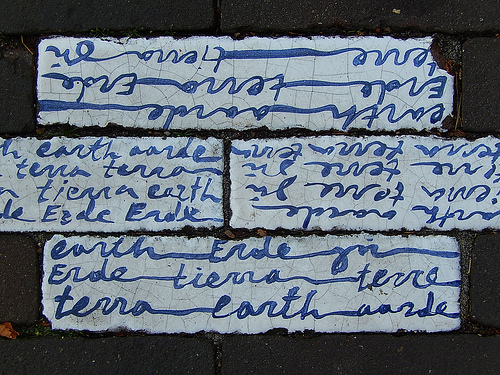
photo credit: Earth Repeating via photopin (license)
“The care of the Earth is our most ancient and most worthy, and after all our most pleasing responsibility. To cherish what remains of it and foster its renewal is our only hope.” Wendall Berry
We were listening politely, and to be honest the speaker up until this point had been unremarkable, with a few points that led me to take notes in my ‘oh-so-hipster’ moleskin journal. It was a youth leader conference filled with thousands of the rarest breed of human… the youth worker. The speaker launched into his climatic point, asserting the importance of contextualizing our ministry and understanding the culture in which we minister. I was tracking… I liked his thoughts on this point. Contextualization made sense as the way to develop authentic community. He then moved to what he seemed to think was his most compelling example: “For instance the green movement – if you live in an area where people are really engaged in environmental issues, then it is important for you to educate yourself on that and even consider participating in the movement; which is fine because we know the Green movement is just a fad. What we as believers know is that when Jesus comes back, he will destroy this earth, so the green movement doesn’t really matter.”
My reaction was similar to what you do when you think you may get in a car accident. I spread my arms out to protect my two volunteers. It was a knee jerk reaction. As we assumed the crash position, I leaned forward and saw the guy to our right looking horrified, while the rest of the crowd hollered and clapped with agreement. Our team quickly befriended our fellow shocked comrade to the right. Following the session, we all sat together and talked about what was so jarring about the speaker’s message. What struck us most was not his words, but the agreement of the rest of the crowd. Did they really believe that the environment doesn’t matter? That God was going to destroy what He had created? We read scripture to suggest that God was asking us to be the stewards of this world, and that a new heaven and a new earth were possible here… there was nothing faddish about that.
The environment will make headlines today as Pope Francis releases an Encyclical, which is a much anticipated letter. The word comes from the Greek egkyklios, with kyklos meaning a circle. The letter will ‘circle’ around to the community of faith. Why should protestants care about an encyclical? Well an encyclical becomes part of the teaching of people, not just on Sundaymornings, but at Catholic high schools and universities. What is held in an encyclical has the power to shape many minds. Each encyclical is met with great anticipation.
According to a leaked document, Pope Francis will discuss his stance on many things, including, most controversially, his stance on the climate change. This has prompted many people to respond, and many of the responses have baffled me. American politicians who are openly faithful have responded in ways that seem to be circular in reason and miss out on some of the most beautiful aspects of our shared faith and humanity. Rick Santorum said Pope Francis should “leave science to scientists,” I giggled when I read this comment, as I was already aware that Pope Francis holds a degree in Chemistry and is highly educated in the sciences. But Santorum isn’t the only American political figure to weigh in. Jeb Bush responded, “I hope I’m not going to get castigated for saying this by my priest back home, but I don’t get economic policy from my bishops or my cardinals or my pope.” A very public Christian, Bush stated that religion “ought to be about making us better as people, less about things [that] end up getting into the political realm.”
When did we get so compartmentalized and dualistic in our faith? Jeb Bush seems to have forgotten his statement to a Catholic newspaper after leaving office: “You hear people say, ‘I don’t want to impose my faith.’ Well, it’s not an imposition of faith, it’s who you are.” I agree with the earlier statements Mr. Bush made, “It’s who you are.” In many ways, when I read the story of Adam I am struck with just how connected we are with the environment and just how much it is ‘who we are.’ In the poetry of Genesis, Adam is named ‘Adam’ because he is made of the red dirt. He is essentially ‘dirt man.’ Logic would conclude that we are all dirt. We are a part of the very earth we inhabit. It makes sense to try and protect the very essence of who you are. Who I am. Who we all are.
We shouldn’t be surprised that Pope Francis sees our deep connectedness to creation and all that is within it. In his inaugural speech he stated the reason he adopted the name of Saint Francis was because “it means protecting all creation, the beauty of the created world, as the Book of Genesis tells us and as Saint Francis of Assisi showed us. It means respecting each of God’s creatures and respecting the environment in which we live.” I am praying today that Pope Francis’s statements will spill out beyond just the Catholic person of faith, and that all people of faith would begin to question anyone who thinks that for God this place is just dirt—and as such he will just destroy it. That doesn’t sound like the God who would breathe his very breath into dirt to create humanity, something that again and again God has called good.
[…] To read the rest of Sarah Heath’s blog, click HERE. […]
[…] To read the rest of Sarah Heath’s blog, click HERE. […]